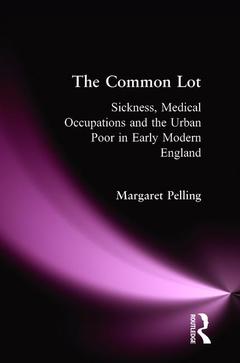The Common Lot Sickness, Medical Occupations and the Urban Poor in Early Modern England
Auteur : Pelling Margaret

Introduction.
PART ONE THE URBAN ENVIRONMENT
1. Medicine and the Environment in Shakespeare's England.
2. Food, Status and Knowledge: Attitudes to Diet in Early Modern England.
3. Illness among the Poor in Early Modern English Towns.
4. Healing the Sick Poor: Social Policy and Disability in Norwich 1550-1640.
PART TWO AGE GROUPS AND GENDER
5. Child Health as a Social Value in Early Modern England.
6. Old Age, Poverty and Disability in Early Modern Norwich: Work, Remarriage and Other Expedients.
7. Older Women: Household, Caring and Other Occupations in the Late Sixteenth-century Town.
PART THREE OCCUPATIONS
8. Nurses and Nursekeepers: Problems of Identification in the Early Modern Period.
9. Occupational Diversity: Barber-surgeons and other Trades 1550-1640.
10. Trade or Profession? Medical Practice in Early Modern England.
- Health and medicine are subjects of growing interest to social historians.
- Provides analysis of the health experience of the majority of the population in this period - artisans, labourers, servants, the poor and women which has tended to be neglected by historians.
- Contains essays published here for the first time and a substantial introduction and commentary.
- Broad themes are considered including growing anxiety about health and illness, lay involvement in medicine, the effects of urbanization on the health and the sensitivity of chronic disease as an indicator of social conditions.
Date de parution : 12-2016
15.6x23.4 cm
Thème de The Common Lot :
Mots-clés :
Sick Poor; sick; Early Modern; poor; Medical Practitioners; norwich; Norwich Census; authorities; Norwich Authorities; census; Chronic; early; Urban Poor; modern; period; Cpl; relief; Medical Poor Relief; medical; London Barber Surgeons; Early Modern England; Poor Relief; St Bartholomew's Exchange; OED; Cambridge PhD Thesis; Mayor's Court; Early Modern Medicine; Tudor Economic Documents; Great Instauration; Married Women; Occupational Diversity; Large Families; Turning Spits



